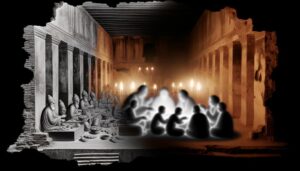Meaning of Agrippa in the Bible: Historical Insights
In the Bible, ‘Agrippa’ refers to two key figures: Herod Agrippa I and Herod Agrippa II, both of whom played essential roles in first-century Judeo-Roman relations. Herod Agrippa I, known for his persecution of early Christians and the execution of Apostle James, ruled Judea under Roman oversight from 41-44 CE.
His sudden death, described as divine retribution, marks a significant biblical event. His son, Agrippa II, played a diplomatic role during the Great Jewish Revolt and presided over Apostle Paul’s trial.
These dynamics underscore the complex interplay between political power and burgeoning Christian traditions.

Meaning of Agrippa in the Bible: Role, Legacy, and Lessons
| Aspect | Meaning |
|---|---|
| Name | Agrippa |
| Biblical Reference | Acts 25–26 |
| Identity | Herod Agrippa II, Jewish monarch under Roman rule |
| Key Event | Heard Paul’s defense and said, “Almost thou persuadest me to be a Christian” (Acts 26:28) |
| Historical Role | Figure of political power, caught between Roman politics and Jewish faith |
| Spiritual Insight | Represents those who are close to belief but hold back due to worldly concerns |
Historical Context of Agrippa

The historical context of Agrippa, particularly King Herod Agrippa I and his son Agrippa II, is deeply intertwined with the complexities of Judeo-Roman relations in the first century CE.
Agrippa I, a grandson of Herod the Great, skillfully navigated the intricacies of Roman politics, securing favor from emperors like Caligula and Claudius. His reign (41-44 CE) marked a period of relative Judean autonomy under Roman oversight.
Agrippa II, inheriting a fragmented domain, played a significant diplomatic role during the Great Jewish Revolt (66-70 CE).
Both figures exemplify the delicate balance of power and loyalty between Judea and Rome, highlighting the nuanced interplay of local governance and imperial control, as documented in works such as Josephus’s ‘Antiquities of the Jews.’
Herod Agrippa I: Early Life

Born around 10 BCE, Herod Agrippa I, also known as Agrippa the Great, was the grandson of Herod the Great. His early life was greatly shaped by the political machinations and turbulent dynamics of the Herodian dynasty.
Educated in Rome, Agrippa formed significant relationships with key Roman figures, including future emperors Caligula and Claudius. His youth was marked by financial instability and political exile, often relying on the generosity of his friends and patrons.
Agrippa’s familial connections and the intricate web of alliances and enmities within the Herodian court profoundly influenced his upbringing.
Scholarly accounts, such as those by Flavius Josephus, provide a detailed understanding of Agrippa’s formative years, illustrating the complexities of his early experiences within a volatile political landscape.
Herod Agrippa I: Rise to Power
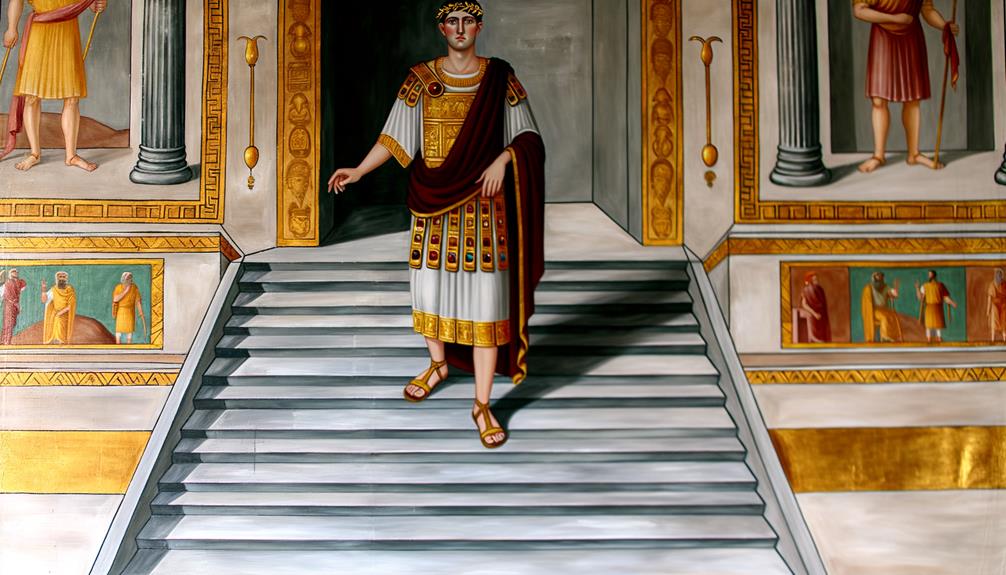
Herod Agrippa I’s ascent to power was marked by astute political maneuvers and strategic alliances with key Roman leaders, particularly Caligula and Claudius.
His early political activities, characterized by a blend of diplomacy and opportunism, enabled him to secure the favor of influential figures within the Roman Empire.
Scholarly references highlight Agrippa’s ability to navigate the complex socio-political landscape, ultimately leading to his appointment as king over Judea, Samaria, and surrounding territories.
Early Political Maneuvers
Steering through the intricate landscape of Judean politics, Agrippa I adeptly leveraged familial connections and Roman patronage to consolidate his authority and ascend to power.
Agrippa, a grandson of Herod the Great, utilized his lineage to position himself favorably within the Herodian dynasty. His political acumen was evident in how he navigated the volatile environment, aligning himself with powerful Roman figures, thereby ensuring his rise.
Scholarly references, such as Schürer’s ‘History of the Jewish People in the Age of Jesus Christ,’ highlight Agrippa’s strategic marriages and alliances that fortified his claim.
This adept maneuvering allowed Agrippa to secure his kingship, portraying him as a shrewd tactician in the early first-century Judean political arena.
Alliance With Roman Leaders
Building on his adept political maneuvering, Agrippa I’s alliance with key Roman leaders was instrumental in his ascent to power, exemplified by his close relationship with Emperor Caligula, which significantly bolstered his position within the Roman Empire.
Agrippa’s ability to secure favor with Caligula, as noted by historian Josephus (Antiquities 18.6.10), led to his appointment as king of Judaea and Samaria. This strategic alliance not only enhanced his territorial control but also solidified his authority.
Further, his relationship with Emperor Claudius, following Caligula’s assassination, guaranteed continuity of his rule, reflecting Agrippa’s diplomatic acumen.
Understanding Agrippa’s alliances provides insight into the political landscape of Judea under Roman dominion and contextualizes his portrayal in biblical texts.
Persecution of Early Christians
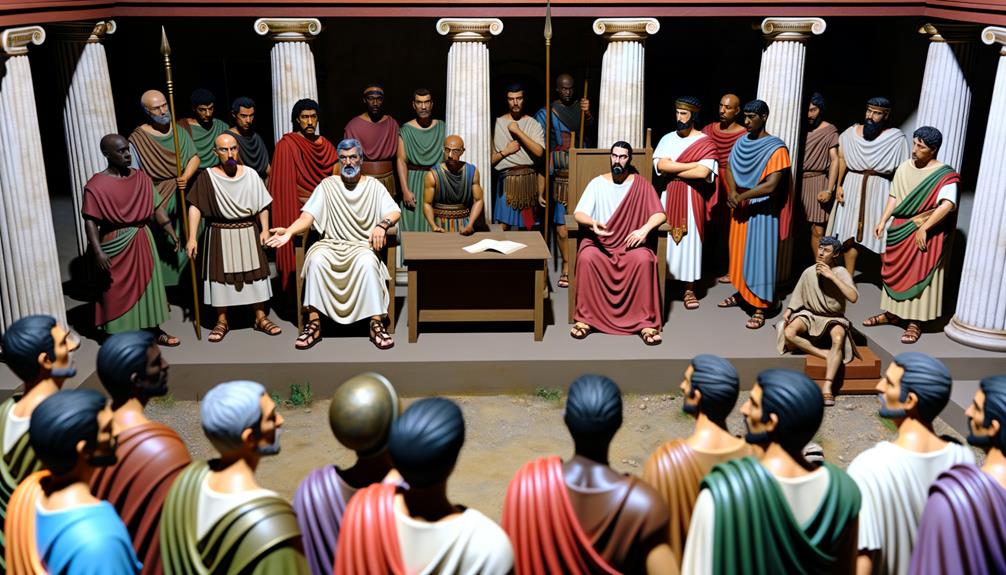
The persecution of early Christians, particularly during the reigns of Agrippa I and Agrippa II, represents a significant period of tribulation that profoundly influenced the nascent Christian community and its subsequent historical development.
Agrippa I, in an effort to solidify his political standing with Jewish authorities and Roman leaders, initiated severe measures against Christians, as documented in Acts 12:1-3.
His successor, Agrippa II, while more lenient, nonetheless presided during a time of heightened tensions, often aligning with Roman policies that marginalized Christians.
These persecutions not only tested the resilience and faith of early Christians but also contributed to the spread of Christianity as believers dispersed to avoid persecution, thereby fulfilling the Great Commission (Matthew 28:19-20).
Execution of Apostle James

Acts 12:2 records the execution of Apostle James, the brother of John, under King Herod Agrippa I, marking one of the earliest instances of apostolic martyrdom within the Christian tradition. This significant event underscores the severe persecution faced by early Christians and illustrates Agrippa I’s role in attempting to suppress the nascent Christian movement.
- Historical Context: Agrippa I’s reign and his efforts to gain favor with the Jewish authorities.
- Theological Implications: The martyrdom of James as an indication to the growing conflict between emerging Christianity and established religious orders.
This profound moment is pivotal in understanding the challenges faced by early apostles.
Herod Agrippa I: Death

Herod Agrippa I’s death, as recorded in Acts 12:20-23, is a pivotal moment underscoring the theme of divine judgment within the biblical narrative.
The account details his sudden and gruesome demise, attributed to his acceptance of blasphemous adulation and failure to give glory to God, resulting in an affliction by an angel of the Lord.
Scholarly analysis, including that by Josephus, offers corroborative historical context, emphasizing the intertwining of divine intervention and historical events in Agrippa’s fate.
Divine Judgment Event
Amidst the grandeur of his reign, Agrippa I’s demise serves as a poignant example of divine retribution, as meticulously chronicled in Acts 12:21-23. This biblical narrative reveals the intersection of human arrogance and divine justice. Agrippa I, adorned in royal apparel, accepted adulation as a god rather than a man, a hubris that precipitated his sudden downfall.
The account underscores critical themes:
- Divine Sovereignty: Agrippa’s death highlights the ultimate authority of God over earthly rulers.
- Moral Consequences: The narrative serves as a warning against the perils of pride and self-deification.
Such elements invite deeper reflection on the theological implications of divine judgment.
Sudden Demise Details
The sudden demise of Agrippa I, as detailed in Acts 12:21-23, encapsulates a dramatic instance of divine retribution, where his acceptance of deific praise leads to immediate mortal consequences.
In the biblical narrative, Agrippa I, adorned in royal apparel, addressed the populace who hailed his speech as the voice of a god, not a man. This moment of hubris triggered divine wrath, resulting in an angel of the Lord striking him down.
Josephus, a first-century historian, corroborates this account, noting Agrippa’s acute abdominal pain and subsequent death.
This episode underscores the theological motif of divine judgment against blasphemy and pride, highlighting the perils of self-deification within the Judeo-Christian worldview.
Herod Agrippa II: Background

Born into the Herodian dynasty, Agrippa II was the last ruler of his lineage to hold power in the region, playing a complex role in the politics of Judea during the first century. His reign was marked by a nuanced interaction with Roman authorities and local Jewish leaders, balancing precarious alliances and conflicts. Agrippa II’s upbringing in the imperial court of Claudius and subsequent education in Rome equipped him with unique diplomatic skills.
- Historical Significance: Agrippa II witnessed the pivotal events leading to the Jewish revolt.
- Political Maneuvering: His alliances with Rome showcased his adeptness in maneuvering imperial politics.
These facets underscore his intricate legacy in Judean history.
Herod Agrippa II: Governance

Herod Agrippa II’s governance was characterized by a delicate equilibrium of authority, leveraging his deep understanding of Roman administrative practices and local Jewish traditions to maintain relative stability in a turbulent era.
His reign was marked by efforts to placate both Roman overlords and Jewish subjects, ensuring minimal friction between the two groups. Agrippa’s policies reflected a nuanced approach to governance, with a focus on cultural and political diplomacy.
| Aspect | Roman Influence | Jewish Tradition |
|---|---|---|
| Administrative | Roman legal frameworks | Local Sanhedrin involvement |
| Religious | Roman tolerance | Temple oversight |
| Economic | Roman tax policies | Jewish festivals and trade |
| Social | Roman civic projects | Jewish community support |
| Political | Alignment with Roman governors | Advocacy for Jewish autonomy |
This balanced governance strategy allowed Agrippa to navigate a complex socio-political landscape effectively.
Interaction With Apostle Paul
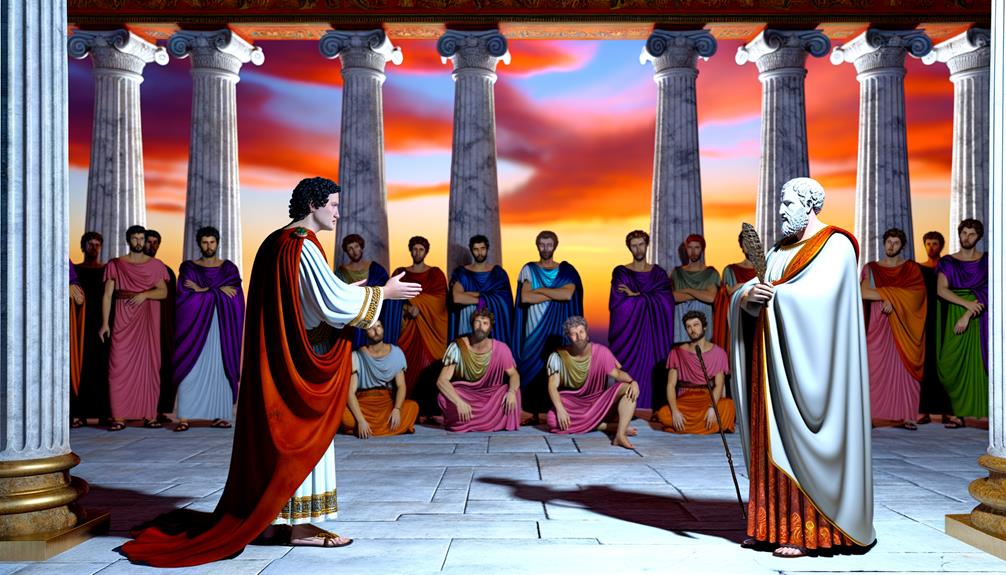
Amidst his efforts to balance Roman and Jewish interests, Agrippa II’s interaction with Apostle Paul stands out as a significant episode highlighting his role in early Christian history. Recorded in Acts 25-26, this encounter is notable for several reasons:
- Legal Proceedings: Agrippa II presided over Paul’s trial, offering a rare glimpse into the judicial processes of the time (Acts 25:13-27).
- Theological Discourse: Paul’s defense included a profound exposition of his faith, challenging Agrippa’s understanding of the Jewish scriptures (Acts 26:1-29).
Scholars often reference this episode to understand the complexities of early Christian propagation and Roman governance.
Legacy of the Agrippas

Examining the legacy of the Agrippas reveals a complex interplay of political acumen, cultural influence, and their lasting impact on both Jewish history and early Christian narratives.
Herod Agrippa I and II, as rulers of Judea, navigated a delicate balance between Roman authority and Jewish autonomy. Their reigns saw significant infrastructural development, including the expansion of Jerusalem’s walls and public works.
Scholarly references, such as Josephus’ ‘Antiquities of the Jews,’ highlight Agrippa I’s efforts to maintain Jewish traditions while appeasing Roman overlords. Agrippa II’s interactions with pivotal figures in early Christianity, although politically motivated, inadvertently contributed to the historical documentation of early Christian thought.
Consequently, the Agrippas’ legacy is etched in both political maneuvering and cultural progression.
Agrippa in Christian Tradition
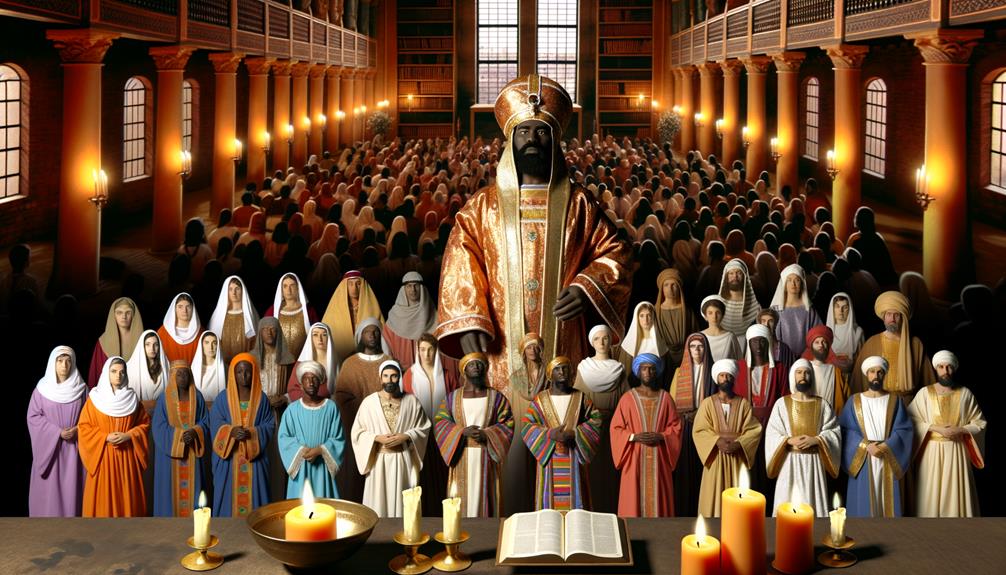
Agrippa’s historical context provides essential insight into his interactions with early Christian figures, particularly as chronicled in the Acts of the Apostles.
Significantly, Agrippa II‘s engagement with Paul, as depicted in Acts 25-26, highlights the political and religious dynamics of the period.
Scholarly examinations, such as those by Bruce (1988) and Barrett (1998), underscore Agrippa’s role in shaping the nascent Christian tradition through his judicial decisions and dialogues.
Agrippa’s Historical Context
Herod Agrippa I and Herod Agrippa II, significant figures in the New Scriptures, played pivotal roles in the early Christian narrative, influencing both the political and religious landscapes of their time.
Their reigns marked a complex period of Judean history, characterized by fluctuating Roman policies and Jewish discontent. Agrippa I’s consolidation of power under Caligula and Claudius and Agrippa II’s political maneuvering amidst Jewish revolts reflect their intricate roles.
- Political Influence: Agrippa I’s relationship with Roman emperors shaped Judean politics.
- Religious Impact: Agrippa II’s involvement in Jewish temple affairs had lasting religious significance.
- Historical Significance: Their actions and policies provide critical insights into Judeo-Roman relations.
These elements underscore their historical importance in early Christian tradition.
Agrippa’s Role in Acts
In the New Scriptures, the Book of Acts highlights the interactions between Paul the Apostle and Herod Agrippa II, illustrating Agrippa’s role in the broader narrative of early Christian history.
Acts 25:13-26:32 presents Agrippa II as a discerning judge during Paul’s trial, where Paul defends his mission and recounts his conversion. Agrippa’s nuanced understanding of Jewish customs and Roman legalities (Acts 26:3) positions him as a pivotal figure in the judicial proceedings.
Agrippa’s declaration, ‘This man could have been set free if he had not appealed to Caesar’ (Acts 26:32, NIV), underscores the political complexities facing early Christians.
Scholarly interpretations suggest Agrippa’s role bridges the cultural and legal shifts during the nascent spread of Christianity.
Conclusion
The Agrippas, through their historical entanglements and pivotal roles, cast long shadows over early Christian narratives.
From the persecution of nascent believers and the apostolic martyrdom under Herod Agrippa I, to the political maneuverings and Pauline dialogues under Herod Agrippa II, their legacies are indelibly etched in biblical accounts.
This dynastic saga, evocative of both temporal power and spiritual confrontation, invites further scholarly exploration into the intersections of political authority and religious emergence in Judeo-Christian history.





